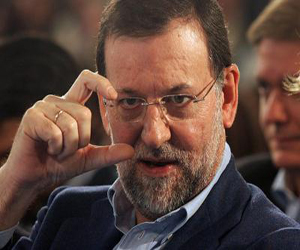Fight Racism! Fight Imperialism! 225 February/March 2012

On 21 December 2011 Mariano Rajoy was sworn in as the new Spanish President. The success of his conservative Popular Party exposed the decay of the social democratic Spanish Socialist Workers’ Party and their worn-out popularity. It took no more than nine days for Rajoy’s government to raise taxes, although during his election campaign he repeatedly stated that he was determined not to do so. From the start of his presidency, Rajoy made it very clear that he would impose the austerity policies demanded by France and Germany. Yet despite this, the IMF predicts a new recession in 2012. JJ RIVAS reports.
In order not to upset powerful investors and to protect Spain’s credit rating, Luis de Guindos, the Lehman Brothers’ adviser for Europe, was appointed Economy Minister. Furthermore, in another blatant display of ruling class self-interest, the newly-appointed Defence Minister is Pedro Morenés, who is the Executive Chairman of MBDA, a company that designs and manufactures missiles.
Public debt is the never-ending pretext for the brutal slashing of public spending. The debt was mostly accrued by regional conservative governments, which speculated using taxpayers’ money for projects that are now useless. One bizarre example is a fully-built airport with neither aeroplanes nor licences to operate.
Because of such projects, politicians from Valencia and Majorca, together with their investment partners, have been charged with corruption and sent to prison. The royal family has also been exposed for corruption. The King’s son-in-law Inaki Urdangarin has been accused of stealing money from a not-for-profit organisation that he managed. In fact, the organisation was awarded public contracts by some of the above-mentioned politicians, and received obscene amounts of money from the public purse. Urdangarin faces trial for embezzlement, fraud, prevarication and forgery, and his wife Princess Cristina may also be implicated.
Most of the mass media have stopped reporting on the people’s struggle against cuts. However, far from disappearing, the 15 May (15M) movement is preparing for a new phase of the fight in which different forces are uniting. Since the nine strikes in September 2011, the 15M movement has supported public education, demonstrated against the privatisation of the water canal in Madrid, has defended public health care and has been setting up new coalitions against house evictions, for the right to dignified housing. In the capital city alone there are 50 active peoples’ assemblies, that each decide on their local actions, such as editing fanzines, setting up information points and picketing town halls.
On 28 December, several Spanish towns held a ‘day of action’, with street theatre, costumes and open assemblies. Around 8,000 people took to the streets in colourful parades full of satirical creativity, mocking politicians under the slogan ‘We’ve lost the innocence’. At the beginning of the march in Madrid, police intimidated protesters, charged the crowd, wounded five activists and arrested two of them.
The two main unions have agreed with the Institute of Directors to limit workers’ pay rises to 0.5%, regardless of the rate of inflation. Therefore, the 15M movement, although completely independent, is currently associating with popular organisations and class unions to confront the forthcoming second reform of the labour market in a year’s time. The state apparatus is concerned about such alliances and the increasing waves of protests, and is trying to undermine the movement, using heavy fines and raising the level of police harassment.
Some measures are just dictatorial: activists face trials and fines for peacefully supporting families that will be evicted from their homes; others have been banned from voting in the general election because they wore T-shirts in support of public education. On 22 January, police officers approached the weekly General Assembly at Sol Square, in Madrid, asked everyone for ID and warned that from the following Sunday, people gathering in political meetings without notifying the authorities will be fined. The word spread and as we go to press, crowds are expected to defy the government’s authoritarian attacks on 29 January and reclaim their right to protest. The social and popular movement is discussing strategies to defend people facing charges, tactics against repression and is organising fundraising activities.
Rajoy’s government will continue to make the poor pay for the capitalist crisis: youth unemployment currently stands at 48.6%. Rajoy bows to Merkel and is determined to use violence to enforce the unpopular measures. However, social unrest spreads and the 15M movement, together with a vast range of social and political organisations, are preparing to fight back, and will gain strength as its first anniversary approaches.




